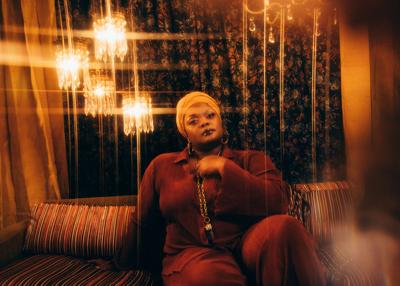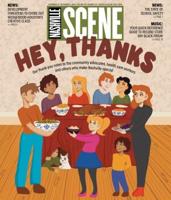
Kyshona
A legacy is a complicated thing.
Who is remembered — and how they are remembered — is often decided by those with money and power. History is written, as the adage goes, by “the victors,” and “victor” is just a dressed-up word for the oppressor. To be remembered, then, is a privilege. And to highlight a once-ignored legacy is a radical act.
Kyshona writes her family’s once-unknown history on her new album Legacy, out Friday. Following her thought-provoking 2020 record Listen, Legacy is a long-gestating project by the singer-songwriter and music therapist, one initially sparked by familial loss and eventually shaped by confronting her ancestral history.
“I found that I started writing a lot of these songs after I lost an elder,” Kyshona tells the Scene. “I hadn’t quite processed it yet, but that was my way, I guess, of processing what I had lost, or who I had lost, trying to immortalize them in a song.”
Those exercises led Kyshona to wonder more deeply about her lineage. That was something difficult to unravel, as records for Black Americans and their families are much less likely to exist or be easily accessible. It wasn’t until she worked with a genealogist at The Smithsonian Institute’s National Museum of African American History & Culture that she had a fuller portrait of her own family tree.
Kyshona and her band were enjoying time off around a tour stop in Washington, D.C., in 2021 when they visited the museum and happened to catch a genealogist when she had free time to talk. The genealogist sat with Kyshona for more than two hours, scouring records and filling in gaps, as part of a free service offered to museum visitors. (The museum’s records date back to the 1860 U.S. Slave Census.) Together they were able to find information about Kyshona’s family that she thought she’d never learn.
“She showed me why I was hitting roadblocks,” she says. “She just showed me other ways of finding my family’s story, like to look at the wills of the men who owned my family. To this day, I’m still not done with all of the assignments she gave me back in 2021, because it’s so complicated. And then you get angry and frustrated and you have to take a beat.”
Prior to working with the genealogist, Kyshona says most of her knowledge about her family came from a great-aunt on her father’s side who tried Ancestry’s DNA testing. She was able to tell her other relatives what tribe they descended from and what region of Africa was once their home.
“I remember how that felt, like, ‘Oh, my God, we actually have a connection — we have a place that we know our people were stolen from,’” she says. “I think I had realized, like, ‘OK, this is a lot to handle.’ It’s a lot to carry, you know — taking on finding the family stories and origins.”
Something Kyshona had to confront while making Legacy was the emotional pain of learning her own history, which had been held by her family for generations. A Black descendant of enslaved people, Kyshona has a complicated relationship with her family tree.
“Being raised in the South, some parts of my family history were so painful they didn’t want to talk about it,” she says. “So that was hidden from me. And it’s like, ‘You know what? First of all, we have to stop keeping secrets. You’ve got to let go of the shame.’ And maybe one way that I could encourage other people to get to talking and sharing stories and sharing our real history is through a record like this.”
To help tell the stories she discovered, Kyshona tapped a stellar roster of guest artists, including Ruthie Foster, Keb’ Mo’ and Odessa Settles, with additional contributions by Brittney Spencer, Aaron Lee Tasjan and more. “The Echo,” one of the singles released ahead of the record, neatly encapsulates both the overarching theme of Legacy — “You are the song / I am the echo,” she sings — and demonstrates the organic, rocking, soulful groove that marks the album.
She recorded the new LP in Memphis at Southern Grooves, the studio of producer-engineer Matt Ross-Spang (whose long, long list of credits includes Margo Price, Jason Isbell and the 400 Unit, The Mountain Goats and many more). She says being in Memphis enabled her to realize her musical vision in ways she never could before. There were plenty of occasions when Ross-Spang’s deep Rolodex of local artists and players helped.
“That experience in Memphis, it was different,” she says. “I could say, ‘Hey guys, think “gospel quartet.”’ And they knew what I meant. I love my Nashville players. But there’s just something different about when you have older Black men in the room with you, and you can make a reference and they get it.”
Kyshona will perform in support of Legacy at 3rd and Lindsley on May 26. She explains that as she rarely plays shows in Nashville, it will feel like a homecoming of sorts. She’s hoping to bring together some of the key players on the album to help really bring the record to life.
“I’m just excited about showcasing these Memphis legends, like these players. I’m excited about telling these stories. But I’m also excited about having fun onstage with my friends. And I hope we get people to go home and talk about their own family history. … We keep them here when we say their names.”










